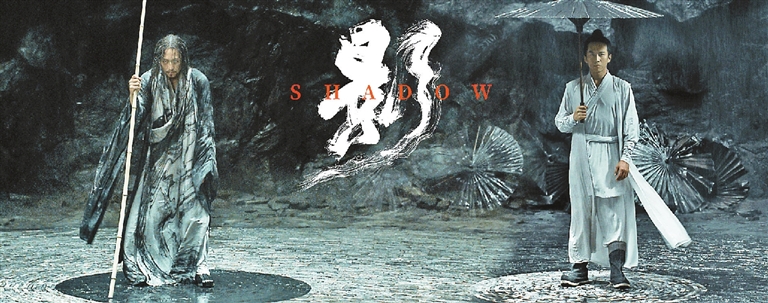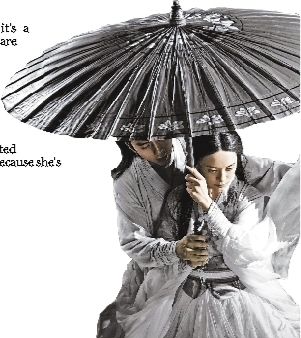


ZHANG YIMOU’S latest epic “Shadow” held its world premiere in Venice, where the Chinese director was honored with the prestigious Glory to the Filmmaker award, before traveling to Toronto for the movie’s North American gala premiere. Inspired by centuries-old ink-brush paintings, the director crafts a unique historical film with next-level fighting sequences the director has become known for throughout his career, from “Hero” to “House of Flying Daggers,” only this time with an army of deadly umbrellas. The Hollywood Reporter calls the new film “stunning” in its review, which, despite its black-and-white tones, pops off the screen. Zhang tells the story of a powerful king who has been displaced from his homeland and whose people long to win it back. The king’s simple yet cunning military commander has trained a “shadow,” a body double, who might be his only key to winning back the kingdom. THR spoke with Zhang in Venice about where his idea for killer umbrellas came from, why he decided to paint his film like a picture, and just how far away Hollywood and China are from combining forces. THR: The film feels as if it was almost shot black and white without being black and white. Why did you decide to shoot it in color? Zhang: I’m very fond of Chinese traditional black-and-white ink paintings, so I wanted the film to have the same effect. Each scene is meant to look almost like it could come alive from a Chinese ink painting. THR: Why was it important to frame the film with a feminine story in this very masculine world? Zhang: If you look at the surface, it’s a story about men that are struggling for power, for survival. But then you have this female character who even though she doesn’t have many scenes, she’s the most complicated character in the film, because she’s always facing choices at every turn of the plot. In this film, the most complex part is the feeling inside her character. THR: “Shadow” features one of the most incredible fight scenes, featuring a battalion of armored umbrellas. Where did the idea for that come from? Zhang: It was my original idea, something we’ve never seen before. You’ve seen similar things in Chinese kung-fu movies, with other kinds of director devices, inventing weapons with various instruments, maybe using just a tree or a leaf to fight. I’ve also played with this in my previous film “Hero.” THR: How do you hope American audiences view the film? Zhang: I hope they like it. I think for American audiences this is a film that relates a different culture. Of course, we know that East and West, they always have this cultural gap in the middle. But, of course, today, the benefit we have when sharing films is being able to learn something about another culture. THR: Would you make another film in English, after “The Great Wall?” Zhang: For me making films in English, I don’t feel as free as when I make films in Chinese. So in any case if there is some good story, I might consider it. But I feel more comfortable doing stories in Chinese. THR: Why haven’t there been more big films like “The Great Wall” trying to bridge China and Hollywood? Zhang: I believe the connection between Hollywood and China is becoming closer and closer. It’s something that is useful for both sides. We would both like to have this cooperation. We must find some common points, but in something that might be appreciated by both audiences. But it’s difficult. And there are many people trying to do it. I believe there is still a lot of work to do on this. THR: What kinds of stories do you think it will take to bring the industries together? Zhang: I think the [basis] is that you must produce a good film with a good story. But the problem is, for example, a director might make a story that the Chinese audience loves, and maybe the American audience finds it is a beautiful story, but doesn’t get the point. Or maybe you have something that in China works very well but in America it is not what everyone is expecting to see. So I think it is really one of the cases that finding the right story that translates across both markets is difficult to achieve. So I think it will take some time and we still need more occasions to try. THR: What are you working on next? Zhang: I just finished shooting a movie that takes place in the 1970s. The title of this new film is “One Second.” It’s a story that contains many elements drawn from my own personal experience. The plot is about a convict who escapes prison in order to see a film. It’s a film about film. (SD-Agencies) | 
